BREATHLESS (1960)
A thief steals a car and impulsively murders a motorcycle cop, fleeing the police to Italy with a hip American journalism student...
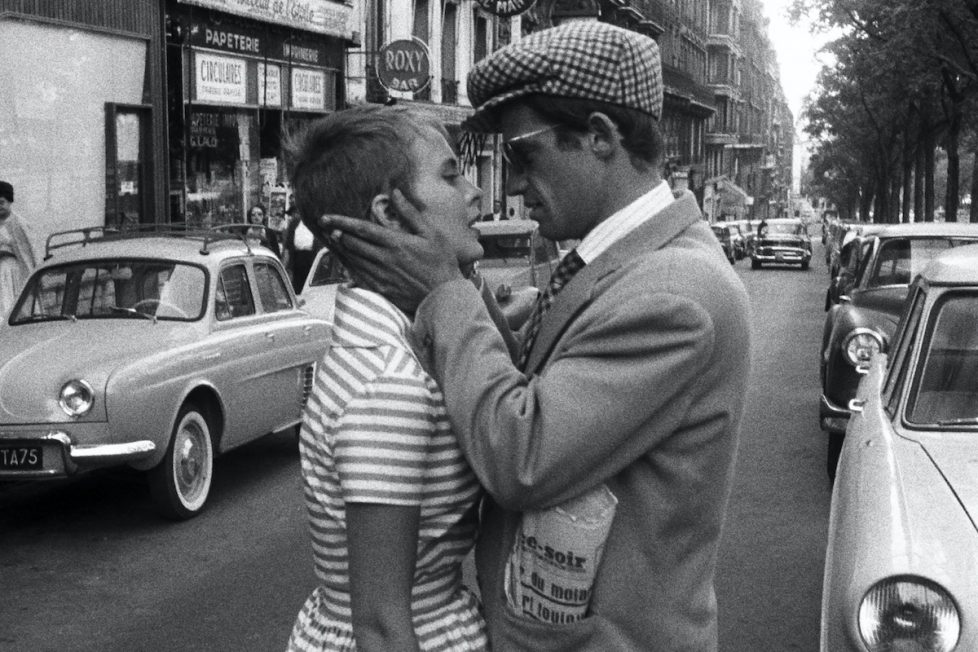
A thief steals a car and impulsively murders a motorcycle cop, fleeing the police to Italy with a hip American journalism student...


Frequently appearing in lists of the all-time greatest movies, Jean-Luc Godard’s debut feature Breathless / A Bout de Souffle remains as fresh and startling today as 60 years ago. It’s a non-stop careen through the daily life of a small-time French crook and his younger, wiser American girlfriend, shot in the documentary style of the French New Wave (which Godard helped create), but also, self-consciously, owing much to the Hollywood gangster drama.
Above all, it’s cool, and not only by today’s nostalgic standards. As Jefferson Hack says in one of the extras on this 60th anniversary Blu-ray, it’s a movie of cigarettes, sunglasses, and fast talking—all things we associate with the period. But it also salutes the emblems of coolness in 1960 itself; things that we might have forgotten, like the sleek models of jetliners in travel agents’ offices, or the glamour of working in television.
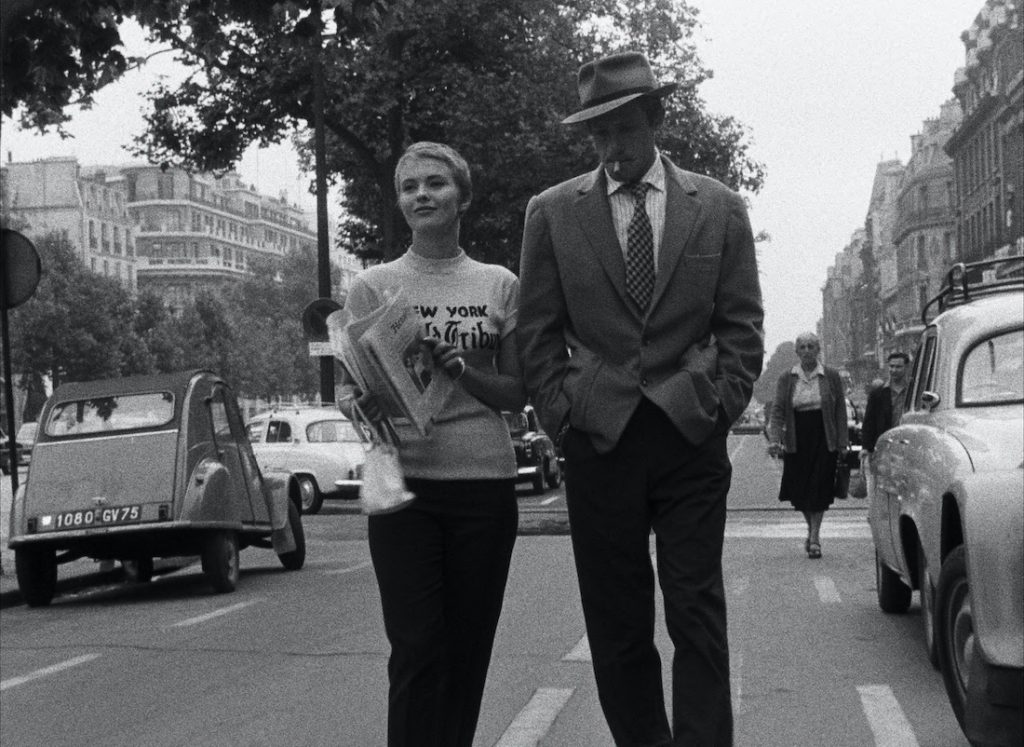
Indeed, on another extra, film scholar Colin MacCabe describes it as an anthropological study of 1959 Paris. “Anthropological” is the key word, as it’s very much about life as lived by real people (albeit somewhat romanticised), and though it nods quickly to Notre-Dame, the Eiffel Tower, the Arc de Triomphe and so on, it’s emphatically not a swooningly-in-love-with-the-City-of-Lights movie. The famously unromantic (and slightly cryptic) last lines make that clear.
Michel (Jean-Paul Belmondo) is a young criminal who steals a car in Marseille and sets off for Paris—a brilliant early sequence in which his stream-of-consciousness chatter (to the audience?) while driving makes it clear that Godard isn’t going to be bound by fourth-wall conventions, and his obsession with overtaking gives us a telling glimpse of his character.
On the way, he’s stopped for speeding and—worried because the car is stolen—shoots the cop who pulled him over. The murder is momentary, barely visible, almost incidental, as Godard again departs from the established norms. The crime is an essential building block in the storyline, and many directors would make it a major moment, but Breathless is much more interested in the criminal than the crime.
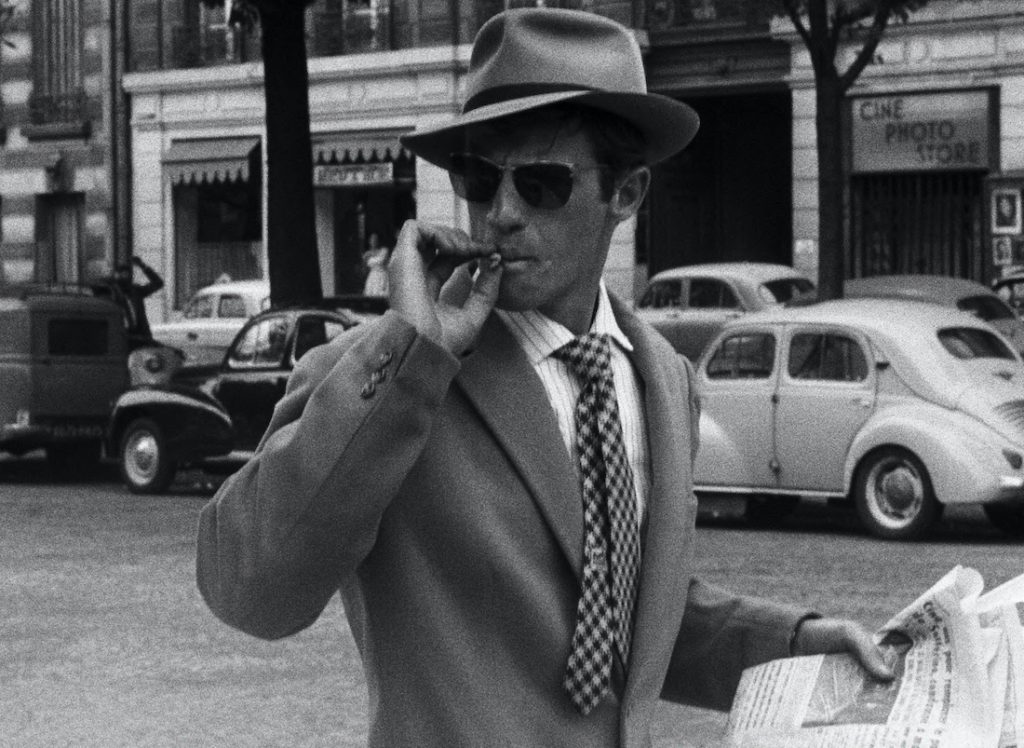
Michel escapes on foot and makes it to Paris, where he tries to raise money to flee to Italy. He also spends time with Patricia (Jean Seberg), an American expat and aspiring journalist who seems half-fascinated by, half-cautious of her disreputable friend. “We look each other in the eyes and it means nothing,” she says.
A large part of the film simply depicts Patricia and Michel talking in her tiny apartment. Nearly everything he says is, in some way, trying to bring the conversation round to sex while she’s trying to discuss books or music… and the episode culminates in one of the wittiest sex scenes ever filmed. He may be a murderer on the run, but his desires are immediate, and he seems to have little sense of the drama he’s involved in, as the police (led by an excellent Daniel Boulanger as Inspector Vital) close in.
So, while in many ways resembling an American film noir, Breathless goes in a very non-American (and, at the time, non-French) direction by putting almost irrelevant action and dialogue at its centre, and relegating what would normally be the main story (the killer on the run versus the detectives hunting him) to the sidelines.
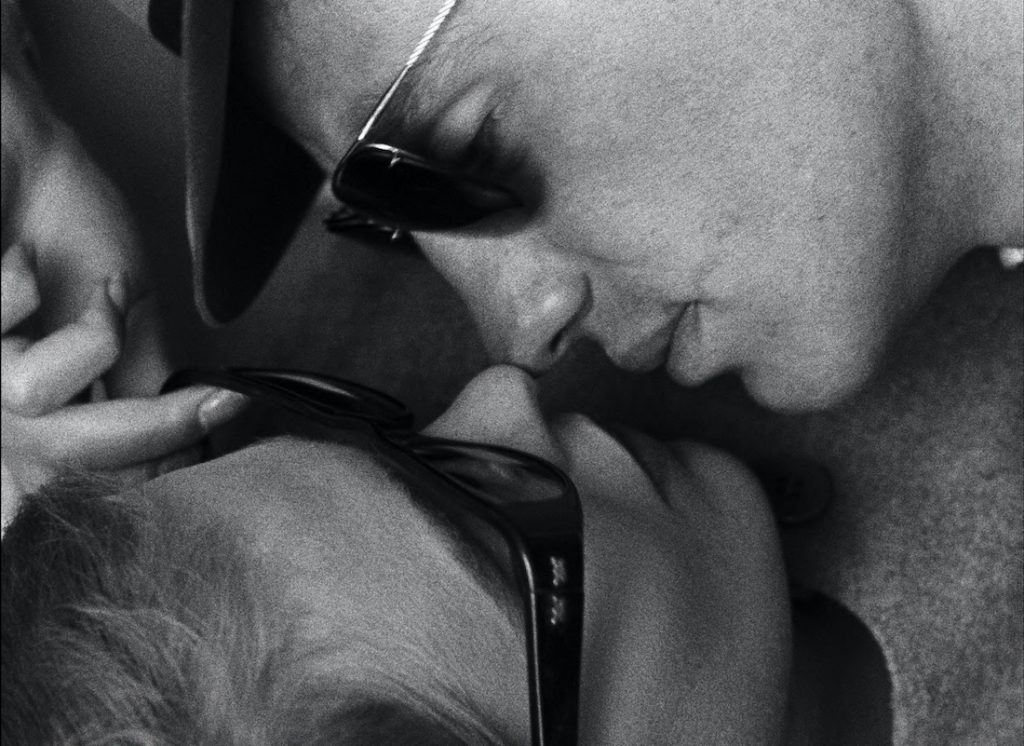
The result is a film with a different rhythm from the usual commercial product of the period (or indeed of today). Breathless isn’t structured around ups and downs, mini-resolutions followed by fresh challenges. It saunters. It always feels slightly unresolved but unhurried, and even the main elements of the story and the characters seep into the audience’s awareness almost impressionistically, rather than through the usual careful highlighting.
This casual, fly-on-the wall approach is reinforced by Raoul Coutard’s mobile cinematography using handheld cameras (tracking shots were achieved with a wheelchair!), little artificial lighting, and real locations. It’s odd in that respect that the entire soundtrack was added after shooting, though ambient noise may have made it unavoidable. (Godard certainly didn’t reject more sophisticated production methods out of hand; in the Tempo documentary on this disc, he says he’d like to work in Hollywood to get his hands on the best equipment.)
Belmondo, an up-and-coming actor rather than a big star at the time, is at the centre of the film, creating an utterly convincing Michel: cocky with a touch of menace, worried underneath but successfully hiding it from himself as well as others. Seberg was more of a name, with Otto Preminger’s Saint Joan (1957) and Bonjour Tristesse (1958) under her belt, and although her role as the gangster’s half-hearted moll may exist primarily as a prism through which we see the Belmondo character, she’s more than capable of holding a scene on her own too.
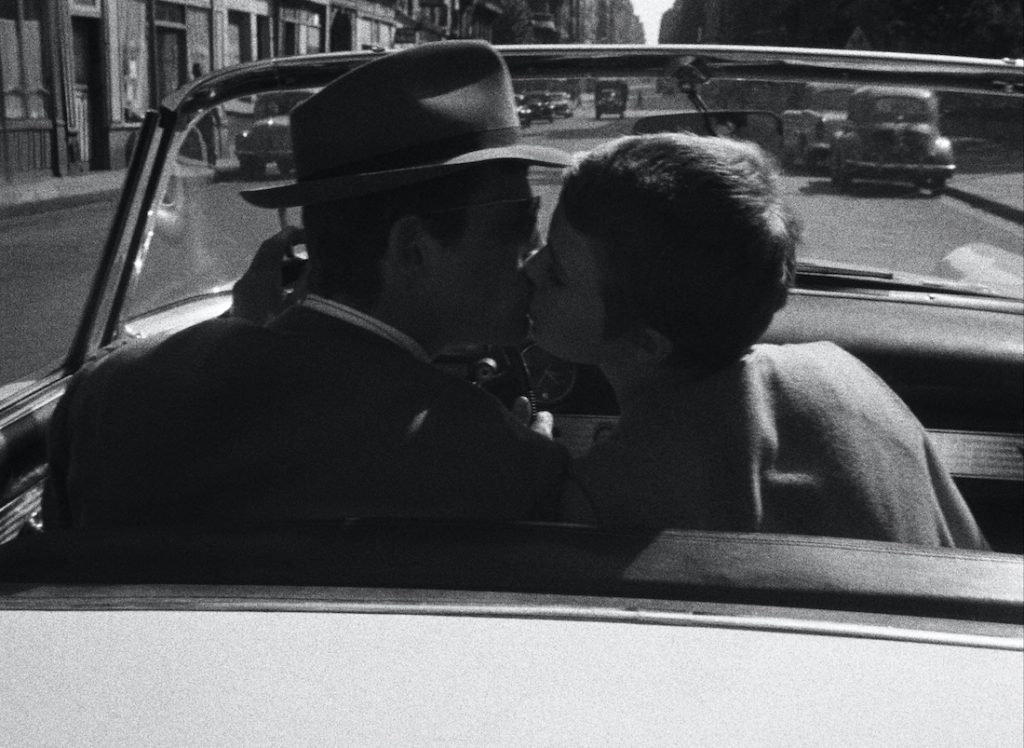
Especially notable is the press conference where she tries to question a pretentious writer (Jean-Pierre Melville), and is repeatedly rebuffed—probably for being young, blonde, and American, as well as a woman. Michel is not present in this scene, but her combination of confidence and insecurity reflects his, and we start to understand how two such different people have formed a relationship.
Beyond the performances and the nervy style that makes it impossible to guess what’s coming next, Breathless abounds in little touches that often seem to be there simply for the sake of delight. Most obvious are the numerous Hollywood references—it’s dedicated to the American low-budget studio Monogram Pictures, as the camera lingers on a frame-filling still of Humphrey Bogart outside a cinema, and indeed the character of Michel probably imagines himself as being in a movie.
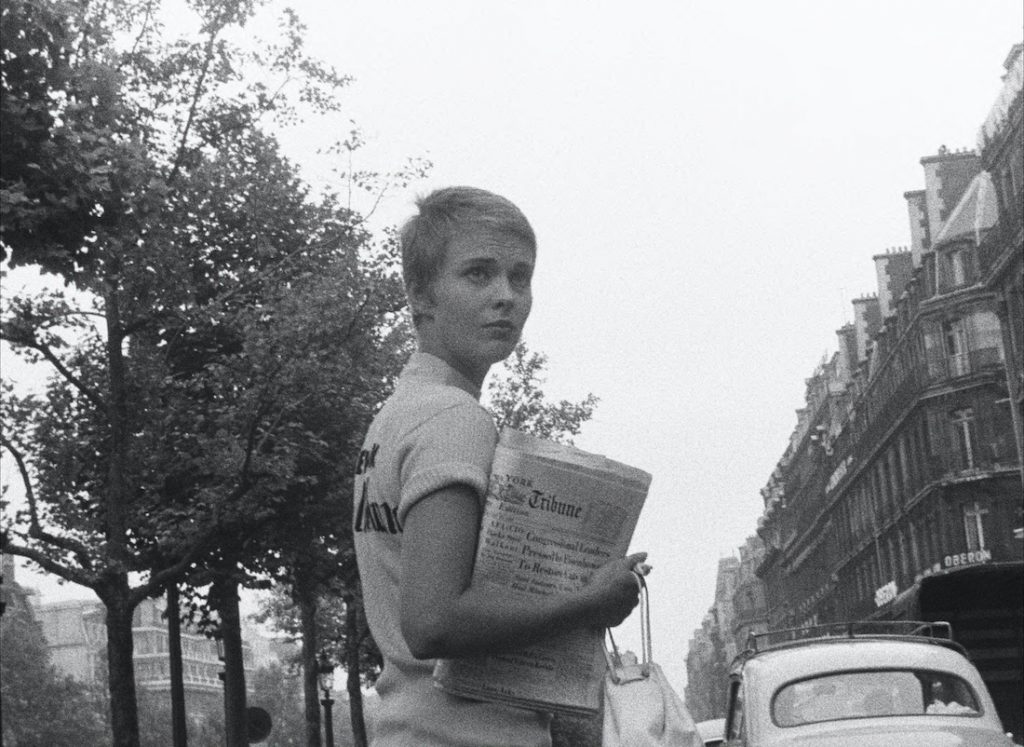
Hiroshima Mon Amour (1959), directed by Godard’s fellow New Wave pioneer Alain Resnais, is also seen playing at a cinema, and even the influential French film magazine Cahiers du Cinéma (for which Godard was a critic) makes an appearance. Godard himself crops up as a man who recognises Michel in a newspaper. It’s a tiny role but a significant one, given how obsessed Michel is by checking the papers.
The acting is full of surprises, too. Tiny actions like Michel adjusting the mirror in his car with a gun, or the way that he pulls a bedsheet over his head and then off again while talking to Patricia, are not necessarily laden with symbolism but contribute to the feeling that in Breathless, something unexpected could appear any second. Indeed, the many rather jarring cuts created by Godard’s idiosyncratic approach to editing have the same effect, as does Martial Solal’s score—sometimes jazzy, sometimes lushly orchestral.
Breathless isn’t a message movie. On the face of it, the film just shows things that happen, without investing much deep meaning in them, an approach that would be endorsed by Belmondo’s Michel: “Burglars burgle, murderers murder, lovers love.” But it does that with such vibrancy and inventiveness, often in the small details as well as the big radical departures from convention, that it’s an endlessly watchable love letter to real life and to cinema.
FRANCE | 1960 | 90 MINUTES | 1.33:1 | BLACK & WHITE | FRENCH • ENGLISH

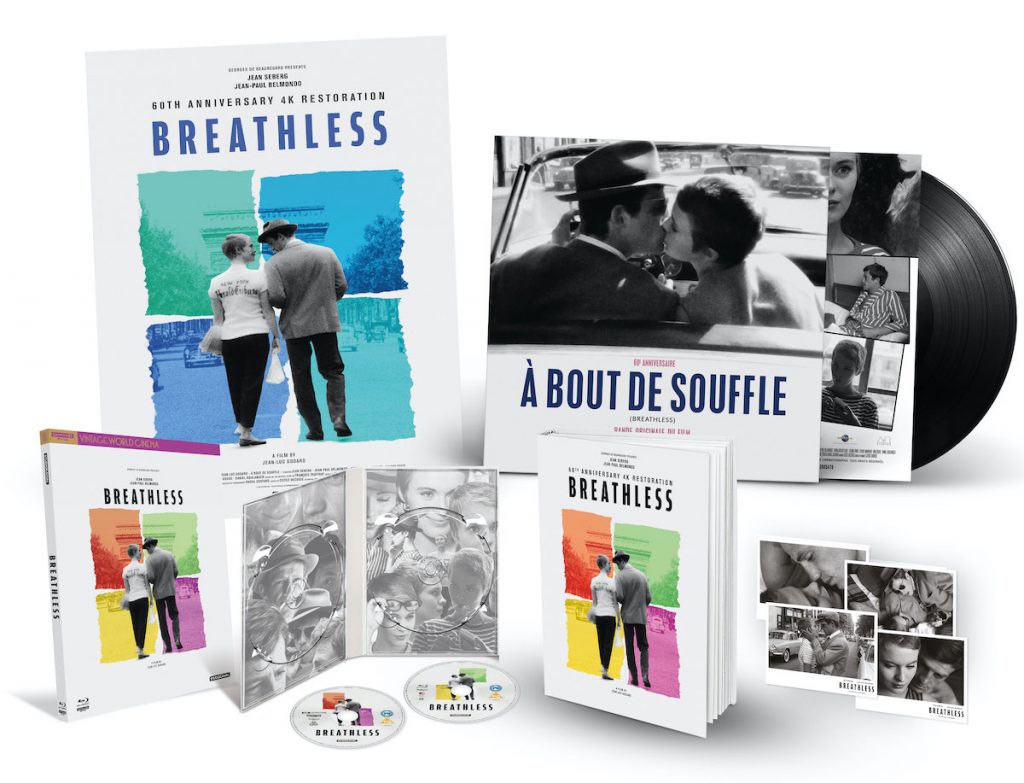
StudioCanal’s 2020 reissue comes with some outstanding extra features, details of which are below, and seems technically impeccable. I wasn’t able to review the 4K Ultra HD version, that’s also available, so can’t comment on the full glory of the restoration.

director: Jean-Luc Godard.
writer: Jean-Luc Godard (story by François Truffaut & Claude Chabrol).
starring: Jean-Paul Belmondo, Jean Seberg, Daniel Boulanger, Roger Hanin & Jean-Pierre Melville.
